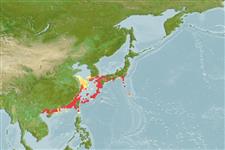Teleostei (teleosts) >
Eupercaria/misc (Various families in series Eupercaria) >
Lethrinidae (Emperors or scavengers) > Lethrininae
Etymology: Lethrinus: Greek, lethrinia, a fish pertaining to genus Pagellus.
More on authors: Temminck & Schlegel.
Environment: milieu / climate zone / depth range / distribution range
Ecology
Marine; reef-associated; non-migratory. Subtropical; 35°N - 20°N
Northwest Pacific: restricted to waters around southern China and southern Japan.
Length at first maturity / Size / Weight / Age
Maturity: Lm ?, range 26 - ? cm
Max length : 45.0 cm TL male/unsexed; (Ref. 2295)
Dorsal spines (total): 10; Dorsal soft rays (total): 9; Anal spines: 3; Anal soft rays: 8. Body color is olive-gray with scattered irregular dark blotches. The head is gray, sometimes there are two blue stripes radiating forward from the eye. The fins are pale or gray, the dorsal with a reddish edge.
Life cycle and mating behavior
Maturities | Reproduction | Spawnings | Egg(s) | Fecundities | Larvae
Carpenter, K.E. and G.R. Allen, 1989. FAO Species Catalogue. Vol. 9. Emperor fishes and large-eye breams of the world (family Lethrinidae). An annotated and illustrated catalogue of lethrinid species known to date. FAO Fish. Synop. 125(9):118 p. Rome: FAO. (Ref. 2295)
IUCN Red List Status (Ref. 130435)
Threat to humans
Harmless
Human uses
Fisheries: minor commercial; aquaculture: commercial
Tools
Special reports
Download XML
Internet sources
Estimates based on models
Preferred temperature (Ref.
123201): 18.5 - 25.4, mean 22.8 °C (based on 98 cells).
Phylogenetic diversity index (Ref.
82804): PD
50 = 0.5000 [Uniqueness, from 0.5 = low to 2.0 = high].
Bayesian length-weight: a=0.01413 (0.00804 - 0.02483), b=2.94 (2.79 - 3.09), in cm total length, based on LWR estimates for this species & Genus-body shape (Ref.
93245).
Trophic level (Ref.
69278): 3.7 ±0.4 se; based on size and trophs of closest relatives
Generation time: 3.7 ( na - na) years. Estimated as median ln(3)/K based on 1
growth studies.
Resilience (Ref.
120179): Medium, minimum population doubling time 1.4 - 4.4 years (Preliminary K or Fecundity.).
Fishing Vulnerability (Ref.
59153): Moderate vulnerability (35 of 100).
